| +++ Bärenreiter News – May 2024 +++ |
Dear musicians
We are pleased to present our newsletter with details on Barenreiter’s new publications.
Would you like to learn more about Barenreiter? In our newsletters you can find out more about the history of the publisher.
Please visit our anniversary page 100.baerenreiter.com and our social media channels regularly. You will find background information and exciting news throughout our jubilee year 2023/2024.
Further information on these editions and music samples can be found on our website. All editions can be ordered directly from our webstore.
We look forward to receiving your orders.
With kind regards,

Your international sales and marketing team
|
|
|
 |
Bärenreiter would be nothing without conductors, instrumentalists and singers who bring our music to life all over the world.
We are immensely grateful for their companionship, their enthusiasm and for their feedback.
During our entire anniversary year we will be raising the curtain for our Bärenreiter Jubilee Ambassadors and presenting selected Ambassadors in our newsletters.
|
| Marc Minkowski, Conductor | |
Founder and Artistic director of Les Musiciens du Louvre
Chevalier de la Légion d´Honneur
"Dealing as often as I do – every season, every month, every day – with Mozart and Gluck operas, how would one live outside of the protection of Saint Bärenreiter? And all the Schubert symphonies which I so luckily recorded in Vienna. And the essential Beethoven from Jonathan Del Mar. And…
You are not a publisher, you are a companion, a partner. On the podium: my other half. Going on, looking for, always improving in parallel. Less a teacher than a brother. You see: I can’t think about it. Simply nature." |
|
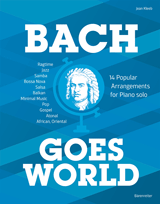 | Compositional dialogue between J. S. Bach and various music cultures as well as contemporary music
Of medium level of difficulty, ideal for piano lessons and suitable for all ages
Recording of all pieces played by the author available on YouTube
|
|
| Kleeb, Jean | Bach Goes World
14 Popular Arrangements for Piano solo | |
| BA 10653 | EUR 16.95 | Performance score | 9790006577606 | These world music pieces can be seen as a compositional dialogue between J. S. Bach and music from America, Africa, the Orient and the Balkans as well as contemporary music. The richness of detail, transparency and polyphonic structure of Bach’s music are significant for the pieces in this collection. Pianists should not expect jazzy variations. Rather, classical, (late) romantic music, ragtime, jazz, samba, bossa nova, salsa, Balkan, minimal music, pop, gospel, atonal techniques, African and oriental sounds are interwoven with Bach’s music, which is quoted and reinterpreted – also as encouragement to play Bach’s piano works as a “counterpoint” to the pieces arranged by Kleeb.
Further volumes by Jean Kleeb:
Beethoven Around the World | BA10931 | EUR 15,50
Beethoven goes Jazz | BA10930 | EUR 15,50
Classic goes Jazz | BA 8760 | EUR 17,95
Mozart goes Jazz | BA 8761 | EUR 13,95 |
|
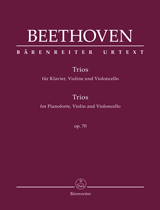 | New sources taken into account
Elimination of discrepancies in previous editions
With a detailed Introduction by Misha Donat, an editorial Foreword (Eng/Ger) as well as a Critical Commentary (Eng) |
|
| Beethoven, Ludwig van | | Trios for Pianoforte, Violin and Violoncello op. 70 | BÄRENREITER URTEXT
Editor: Del Mar, Jonathan | | BA 10960 | EUR 42.95 | Score, set of parts | 9790006575770 | Ludwig van Beethoven's two piano trios op. 70 were written during the composer's visit to his patron Marie von Erdody. Published in 1809, they are now among Beethoven's most famous works of this genre, especially the "Ghost Trio" op. 70 No. 1, the name of which has an unclear meaning and possibly refers to the character of the second movement.
For this new Urtext edition, a further relevant source was at editor Jonathan Del Mar's disposal for the first time, namely a set of parts made for Archduke Rudolf with corrections by Beethoven. By meticulously evaluating all the sources, discrepancies in previous editions were resolved and thus the third movement of Trio No. 2 is reproduced in its original five-part structure. |
|
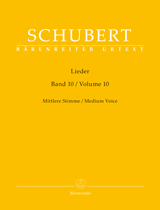 | Clear, uncluttered engraving
Foreword on the genesis and transmission of the works as well as the sources of each individual lied (Ger/Eng)
Includes English translations of the lieder texts by Richard Wigmore |
|
| Schubert, Franz | Lieder
Volume 10 for Medium Voice | BÄRENREITER URTEXT
Editor: Dürr, Walther | | BA 9130 | EUR 39.95 | Singing score | 9790006530700 | Volume 10 of the new Urtext edition of Schubert's lieder contains works composed between September 1816 and August 1817. Above all, the collaboration with his friend, the poet Johann Mayrhofer, was decisive for Schubert's development as a lieder composer in these months.
Already available:
Volume 10 for High Voice
BA 9110 | EUR 39.95 | | |
|
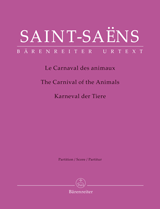 | Urtext edition based on Saint-Saëns "Œuvres instrumentales complètes"
Parts in a large format (25.5 cm × 32.5 cm)
With a detailed Introduction (Eng/Fr/Ger) and a Critical Commentary (Eng) |
|
| Saint-Saëns, Camille | The Carnival of the Animals
A Grand Zoological Fantasy | BÄRENREITER URTEXT
Editor: Teller Ratner, Sabina | | BA 10965 | EUR 44.95 | Full score | 9790006577965 | In February 1886, Camille Saint-Saëns was supposed to urgently complete his "Organ Symphony", but instead he worked on a composition that he had been dwelling on for a long time. This was "The Carnival of the Animals" with which he wanted to surprise the cellist Charles Joseph Lebouc for a carnival concert. Soon very popular within the composer's circle, Saint-Saëns requested that the work was not to be published before his death. The only exception was the penultimate of the 14 movements, "The Swan", which was published before Saint-Saëns died and was arranged in many different ways.
The special appeal of "The Carnival" lies in the diversity of the movements, which take a "zoological" look at pianists as well as numerous animals. Excerpts from works by composers such as Mendelssohn, Berlioz and Offenbach express both admiration and parody. Ultimately, it is this complexity that makes the composition particularly ingenious and entertaining.
The performing edition contains a detailed Introduction (Ger/Eng/Fr) and a Critical Commentary (Eng). | | | | BA10965-74 | Violin I | EUR 5.95 | Minimum order quantity: 4 copies |
| | BA10965-75 | Violin II | EUR 5.95 | Minimum order quantity: 4 copies |
| | BA10965-79 | Viola | EUR 5.95 | Minimum order quantity: 3 copies |
| | BA10965-82 | Violoncello | EUR 5.95 | Minimum order quantity: 2 copies |
| | BA10965-85 | Double bass | EUR 5.95 | Minimum order quantity: 2 copies |
|
|
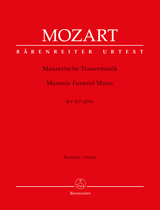 | Reconstruction of the original versions based on the latest state of Mozart research
All three versions in one edition: original scoring (Mozart)/ later scoring (Mozart)/ posthumous double scoring
With a detailed Foreword (Ger/Eng) by Ulrich Konrad |
|
| Mozart, Wolfgang Amadeus | Masonic Funeral Music K. 477 (479a)
Original scoring (Mozart) / Later scoring (Mozart) / Posthumous double scoring | BÄRENREITER URTEXT
Editors: Konrad, Ulrich / Landon, H. C. Robbins | | BA 9189 | EUR 29.50 | Full score | 9790006577828 | Revised edition, replaces BA04709
As Mozart specialist Ulrich Konrad was able to prove in 2020, the version of Wolfgang Amadeus Mozart's "Masonic Funeral Music" that is widely in use today does not stem from the composer himself. Rather, it is a posthumous combination of two different versions of the work, each with different instrumentation.
Mozart wrote this short orchestral piece in 1785 for a Masonic funeral service on the occasion of the death of two members of his lodge. The instrumentation comprised two oboes, a clarinet, a basset horn, two horns and strings. At a later date, Mozart composed two further basset horn parts and a contrabassoon part to replace the horns. The widely known "add-on version", in which all the wind instruments are included, was not intended by Mozart and dates back to the printed publication that contained all the parts in 1805 (i.e. after Mozart's death).
This edition contains all three versions: the original and the later version by Mozart (ed. by Ulrich Konrad) as well as the posthumous double instrumentation (ed. by H. C. Robbins Landon, from the "New Mozart Edition"). The orchestral parts serve all three versions. | | | | | | | | | | |
|
 | Appealing subject matter with a socio-political dimension
Vocal score based on “Opera omnia Rameau”, volume IV.29
Practical, manageable keyboard reduction by François Saint-Yves |
|
| Rameau, Jean-Philippe | Les Boréades RCT 31
Tragédie in five acts | | Editor: Bouissou, Sylvie | | BA 8865-90 | EUR 52.00 | Vocal score (Fr) | 9790006574407 | “Les Boréades” was actually intended to be performed at the Théâtre de Choisy in Paris in 1763 at the end of the Seven Years’ War on the occasion of the peace celebrations. However, after two rehearsals with the biggest stars of the time in Versailles and Paris, the work was cancelled – possibly due to censorship of the libretto which questions the tradition of succession to royal power and makes the self-determination of a woman a topic. These were toxic subjects that must have been unacceptable to the court and the king, who had become sensitized after the assassination attempt on Louis XV in 1757.
In the opera, Boreas who is the god of the north wind, wants to marry one of his sons, Borilée or Calisis, to Alphise, the Queen of Bactria. But she spurns both of them and prefers another, Abaris, much to Boreas’ annoyance. The subversive nature of the libretto and its libertarian morals are made abundantly clear in the characterization of the protagonists: Abaris, who is plagued by self-doubt, is an anti-hero, the gods appear autocratic and stupid, whilst Alphise denounces the tyrannical princes’ abuse of power and demands the right to decide freely for herself – and is publicly tortured for it. ...
|
|
| Scartazzini, Andrea Lorenzo | So sieht's aus
for soprano and piano
Songs based on poems by Nora Gomringer | |
| BA 11439 | EUR 44.95 | Performance score | 9790006565405 | | The LIEDBasel 2020 festival commissioned Andrea Lorenzo Scartazzini to write a song cycle on the theme of "A terribly nice family". The six lyrical texts are taken from various volumes of Nora Gomringer's poetry and illuminate the theme of "family" in an enchantingly enigmatic way. |
|
| New Complete Edition Volumes |
|
| Schütz, Heinrich | | Musikalische Exequien | New Schütz Edition 4
Editor: Schmidt, Beate Agnes | | BA 5926-01 | EUR 155.00 | Full score, linen-bound | 9790006575329 | | Reduced subscription price available | Revised edition, replaces BA00250-01
Violence, hunger and epidemic diseases made death omnipresent at the time of the Thirty Years' War. For every Christian, especially in times of crisis, preparing for their own earthly end was an integral part of life. An expression of this forgotten art of "dying well" are the "Musikalische Exequien" SWV 279-281, which Heinrich Schütz composed at the beginning of 1636 for the funeral celebrations of Heinrich Posthumus Reuß, Lord of Gera. They are among the most fascinating funeral music in European music history and at the same time mark an absolute high point in Heinrich Schütz's oeuvre. The "Exequien" are a unique artistic-religious exploration of the questions of earthly suffering and the promise of eternal life. ...
|
|
| Rameau, Jean-Philippe | Les Boréades RCT 31
Tragédie in five acts | Jean-Philippe Rameau. Opera Omnia (OOR) IV/29
Editor: Bouissou, Sylvie | | BA 8865-01 | EUR 380.00 | Full score, linen-bound | 9790006574391 | | Reduced subscription price available | "Les Boréades", edited by Sylvie Bouissou, the project leader of the Rameau Complete Edition and a central figure in international Rameau research, is a milestone – at last this exceptional work is accessible to scholars and performers in all its facets. Due to legal complications surrounding the manuscript preserved in the Bibliothèque nationale in Paris (with Rameau's corrections), the edition of this major work, which was only discovered and performed in the 20th century, initially had to be postponed for many years.
This critical first edition now benefits all the more from the findings of modern Rameau research and today's editing techniques. As she discusses in the introduction, the editor suspects that the work was not performed as planned in 1763 at the Théâtre de Choisy in Paris because of the sensitive libretto, which may have fallen victim to court censorship. She also discusses problematic editorial issues surrounding bar setting, slurs, the basso continuo and the double bass.
In addition to the score, vocal score and parts in the original keys, the complete performance material is also available in a partially transposed version (BA08875-01). This makes the high registers of the haute-contre parts of Abaris and Calisis workable for performances with a modern orchestra set to 440 Hz pitch; carefully arranged transitions between the keys ensure that these interventions fit in seamlessly. |
|
 |
How did the publishing house get its name?
We owe a precious detail about the history of Bärenreiter to the artist, folk singer and teacher Walther Sturm (1900-1981), whom Karl Vötterle met during the Finkenstein singing week in the Czech city of Moravská Trebová in July 1923. Many years after this event, Sturm recounted that he had been lying on the roof of a railway carriage with Vötterle on a balmy summer night, gazing at the starry sky. They saw the Great Bear and the little star Alkor, called "Bärenreiter" in German, at the bend of the drawbar. That night, Vötterle, for whom the star had had a special significance since childhood as an object of longing for his Wandervogel friends, decided to name the publishing house he was about to found "Bärenreiter". And our publishing logo still shows the little star above the bear today!
We would like to thank Herbert Preisenhammer, the current director of the Walther Hensel Society, for sharing this little story, which Walther Sturm told him personally. As there is no photograph of this memorable night, Jessica Ronja Pelz has illustrated the scene on the railway carriage for the "Bärenreiter Jubilee Magazine".
Illustration: Graphic by Jessica Ronja Pelz, Bärenreiter Jubilee Magazine, p. 13 |
| Bärenreiter at Conventions |
|
| 2024 MOLA Conference in Cleveland, Ohio |
|
This year’s conference of the Major Orchestra Librarians’ Association will take place in Cleveland, May 24-27, hosted by the Cleveland Orchestra.
Bärenreiter editor Emanuel Signer, responsible for orchestral works and chamber music, will attend the meeting and looks forward to seeing old friends and making new ones.
|
   
Errors excepted; price changes and delivery terms subject to change without notice.
Responsible for content (i.S. des § 10 Abs. 3 MDStV): Ivan Dorenburg
Your contact at Barenreiter: Carolin Jetter · jetter@baerenreiter.com · Phone +49 (0)561 3105177 · Fax +49 (0)561 3105310
Bärenreiter-Verlag Karl Voetterle GmbH & Co. KG · Heinrich-Schütz-Allee 35-37 · 34131 Kassel · Germany
Managing Directors: Prof. h. c. Barbara Scheuch-Vötterle, Leonhard Scheuch, Clemens Scheuch
Firma und Registergericht: Kassel HR A 6553 · Komplementärin: Vötterle-Vermögensverwaltungs-GmbH Kassel HR B 3965
Umsatzsteuer-ID-Nr.: DE113096830
Unsubscribe
|
|
 |
|
|
|
|
|
|
|
|
|